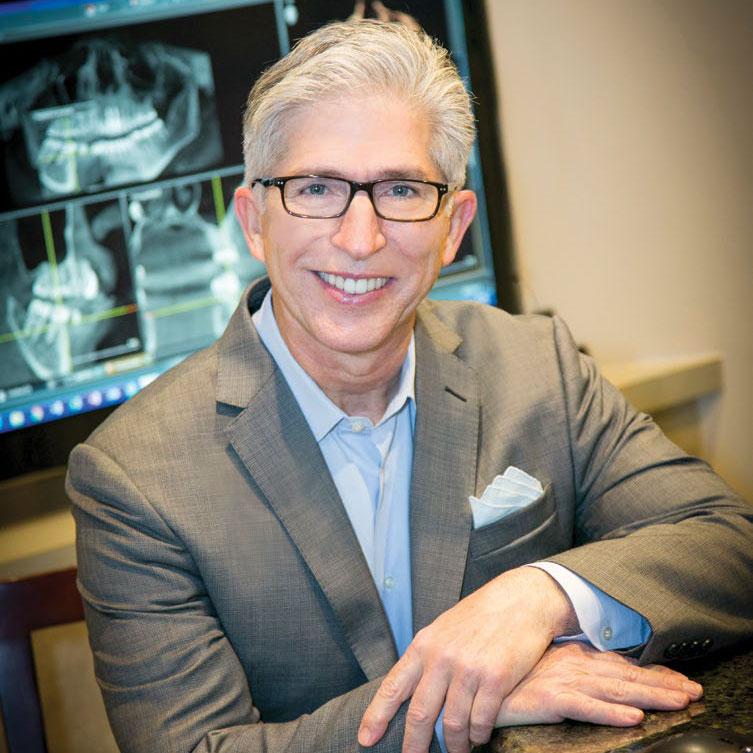
Dental Implants
Dental Implants in Houston
Avoiding Certain Foods? Embarrassed About Your Smile? Dental Implants Are a Permanent Solution for Missing Teeth.- What Are Dental Implants and Their Benefits?
- Candidates for Dental Implants
- Dental Implants Procedure
- Dental Implants Risks
- Dental Implants Pain Management
- Dental Implant Surgery Recovery
- Dental Implants Longevity
- Dental Implants Success Factors
- Types of Dental Implant Restorations
- Dental Implant Technology
- All-On-4® Teeth in a Day - Same Day Dental Implants
- Dental Implants vs. Dental Crowns
- Dental Implants Cost
- Dental Implants Insurance Information
- Why Choose the Fawcett Center for Dentistry for Dental Implants?
- Dental Implant FAQs
What Are Dental Implants and Their Benefits?
Dental implants are a tooth replacement option that completely takes the place of the tooth and its root. Each implant is composed of a titanium post that replaces the root of the missing tooth, a porcelain crown, and an abutment piece that connects the crown with the post.
People with missing teeth often experience problems with chewing or speaking. It may even have a negative effect on their appearance. Dental implants are the ideal way of replacing missing teeth. The implants are designed to become a permanent part of your mouth, just like your natural teeth. In fact, the ceramic crown that is attached to the implant is so lifelike it’s practically indistinguishable from your natural teeth. In addition, the crown is custom-designed and created precisely so that the fit is not only comfortable but also extremely secure so that you won’t even notice it when you chew or speak.

What Makes a Good Candidate for Dental Implants?
What Does the Dental Implant Procedure Entail?
Are There Any Risks Associated With Dental Implants?
As with any major surgery, there are some associated risks. However, dental implant surgery is considered an extremely predictable procedure. Possible risks include infection, numbness, damage to surrounding teeth, or implant failure in extremely rare cases.
We always prioritize your safety above all else, and your dentist will discuss factors that may increase your risk of complications during the consultation process. Patients with increased risks include those who smoke or who have pre-existing medical conditions.

Is Dental Implant Surgery Painful?
How Long Do Dental Implants Last?
What Can I Expect During My Recovery From Dental Implant Surgery?
What Are Common Dental Implant Success Factors?
Types of Dental Implants
Single-Tooth Replacements
Multiple-Tooth Replacements
Full Arch Replacements
What Kind of Technology Is Used for Dental Implants?
What Are All-On-4® Teeth in a Day - Same Day Dental Implants?

Dental Implants vs. Dental Crowns
What Are Some Dental Implant Alternatives?
For those who may not be ideal candidates for dental implants, our practice offers several alternative options. A few examples of services that can provide similar benefits to dental implants include dental bridges and traditional dentures.
Dental bridges can fill gaps left behind by missing teeth, only the procedure does not require oral surgery to be secured. Since treatment uses dental crowns to affix the dental bridge, this option does not stimulate the jawbone. Therefore, bridges do not prevent bone loss like dental implants. Similarly, dentures can restore entire rows of teeth without invasive treatment, but may not offer results that are as secure or natural-looking as dental implants.
Depending on your needs, dentures and dental bridges can be anchored by implants to allow patients to replace consecutive missing teeth while combatting jawbone recession.

Dental Implants Cost
- Number of dental implants
- Location in the mouth
- Degree of surgical difficulty
- Skill and experience of the dentist
- Titanium dental implants: $2,200 – $3,000
- Abutment and crown (ceramic): $2,400 – $3,000
- Total average cost: $5,100
If you would prefer to receive All-On-4® implant-supported dentures instead of individual dental implants to replace each missing tooth, the overall cost of your procedure will most likely be lower. Also, if you do not have sufficient jawbone density to support dental implants, you may be eligible to receive bone grafting, which can make you a better candidate for implants. If bone grafting is necessary, you will likely have a higher cost.
During the consultation process, Dr. Fawcett will conduct a comprehensive oral exam, review your medical history, listen carefully to your goals, and recommend a treatment approach. Then, he can provide an estimate for the cost of your dental implant procedure.
Does Insurance Cover Dental Implants?
Why Choose the Fawcett Center for Dentistry for Dental Implants?

Dr. Fawcett explains, “By having the latest computer-assisted technology that integrates the digital scanning and design capabilities of CEREC® with the diagnostic accuracy of a GALILEOS 3D® scan, I am able to treatment plan the surgical and the prosthetic implant simultaneously, which ensures maximum safety for my patients and a more predictable outcome.”
This is a huge advantage for our patients because they won’t have to visit multiple doctors to complete their treatment. Additionally, Dr. Fawcett can pinpoint the placement and the angle of the dental implant precisely, so patients can have peace of mind knowing that the final crown will fit perfectly in their mouth.
~ Warren Williams
Additional Dental Implants FAQs
Contact the Fawcett Center for Dentistry, P.A.
